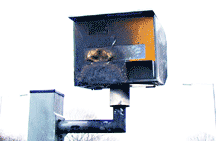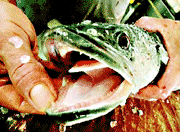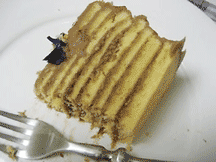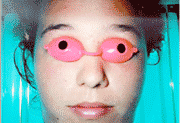|
|||||||||
Alphabet SoupFrom A to Z, Bay Weekly samples the 2008 legislative concoctionby Carrie Madren, Bay Weekly staff writerWe pay our lawmakers to vote on bills that tax us, make us safe, bring us justice and keep us in line. But that’s not all Maryland lawmakers ponder during the 90 days they assemble in Annapolis. Before adjourning April 7, the 2008 General Assembly waded through some 2,600 bills on topics ranging from cell phones to conservation, copper to cake, chemicals to checkout bags. Read on for Bay Weekly’s annual legislative sampler of bills from A to Z.
Animal fur would have had to bear a label stating its creature and country of origin, if House Bill 834 had passed. For Maryland, the bill would have closed a loophole in federal consumer protection laws. In 1998, the Federal Trade Commission changed laws to require labels only on fur worth more than $150; fur trim or patches could go unlabeled. This bill — which failed in the House Economic Matters committee — would have told you whether the faux fur you’re buying is not so faux after all. Bullets won’t need microscopic, laser-engraved serial numbers, now that House Judiciary Committee voted down HB 517 — to the delight of Maryland gun owners and sportspeople. Had it passed, each box of ammunition, bullet and casing would have had to bear engraved, matching serial numbers. Ammo buyers would have had to show ID at the register, and state police would have then kept track of who bought how much ammo, and with what serial number. Critical Area Reform will update laws that protect our waterway buffers and shoreline habitats. For the first time since the Critical Area Law was written 24 years ago, the front-line law — limiting development within 1,000 feet of Chesapeake and coastal waterways — will get much-needed modernization. Currently developers and builders find it easy to get variances from the law, and don’t mind paying paltry fines to construct million-dollar homes. Regulations vary among the 64 jurisdictions that try to administer and enforce the law, and archaic maps from 1972 guide projects. The 2008 law also changes the rural shoreline buffer between construction and the water from 100 feet to 200 feet. Dry cleaners won’t have to pay for repairs of clothing damaged in cleaning. HB 776, based on the infamous D.C. Pants Suit, would have required a dry cleaner or launderer to pay not only for the repair of damaged clothing but also for the cost of replacing a lost an item. The House Economic Matters Committee voted it down.
Enforcing speed limits will get easier for police now that the General Assembly voted to allow local departments to install roadside speed cameras near state highway work sites and in neighborhoods. Foie gras will still be legal in Maryland restaurants after a bill to ban it was rejected. This liver pate — produced by force-feeding geese and ducks, often by forcing tubes down their throats — was deemed cruel and torturous to birds by more than three dozen sponsors. Still, the bill was withdrawn from the Environmental Matters Committee for further study. Global Warming Solutions won’t reduce Maryland’s greenhouse gas emissions 25 percent from 2006 levels by 2020. Specifically, SB 309 would have given Maryland Department of Environment timelines for creating a cap-and-trade system to help companies to meet established limits. Holidays were on the minds of state lawmakers, who proposed several new reasons to celebrate. Holidays we won’t be celebrating — voted down in committee — include February 6 as Ronald Reagan Day; the last week of June as Pollinator Week; April 6 as Juvenile Diabetes Day and the Friday after Thanksgiving as American Indian Heritage Day.
Incidental taking of the Delmarva fox squirrel will be allowed — if you’ve got your DNR permit. You still can’t hunt this native fox squirrel, an endangered species. But now that HB 223 passed the House and Senate, you won’t be a lawbreaker if a fox squirrel perishes while you’re logging or carrying other lawful activities in their habitat. DNR proposed this bill after a strong comeback in fox squirrel populations, which live mostly on forested tracts of private land. Juveniles will find it harder to get alcohol now that both houses of General Assembly have approved legislation to impose stiffer fines on adults for giving liquor to minors. Under this bill, it would be a misdemeanor to distribute alcohol to minors — unless they’re immediate family and you’re at home. Lawbreakers could face up to 60 days in prison or a fine of $1,000 — or both. HB 76 flew through the House with a nearly unanimous vote, as did the Senate’s version.
Keeping drivers from gabbing to distraction was the aim of SB 2, which would have outlawed hands-on cell phone usage — including text messaging — while driving, with exceptions for hands-free devices. If the bill had passed, cell phone chatting would have become a secondary offense; in other words, police could cite you only if you were also violating another law. Advocating for the law was a Maryland family whose daughter was killed by a tractor-trailer driver texting while driving through an intersection. The House’s Environmental Matters Committee killed this year’s bill. Living shorelines will be the norm under the new Living Shoreline Protection Act of 2008. The law requires waterfront property owners to install non-structural, or living shorelines except where it’s not feasible or shorelines erode more than two feet per year. Unlike riprap or bulkhead, natural shorelines create habitat for wildlife, including nesting grounds for our state reptile, the diamondback terrapin. Marylanders will eventually save energy and money with Gov. Martin O’Malley’s EmPOWER Maryland Energy Efficiency Act of 2008. SB 205 and HB 374 require the state to reduce its per capita energy use 15 percent by 2015. That means better energy efficiency and more renewable power sources, like solar, geothermal and wind energy.
Non-native, nuisance animal species are less welcome inside Maryland. HB 630 gives Maryland Department of Natural Resources more authority to prohibit sale, transport, introduction, possession, harvest and introduction of alien species — like the nefarious snakehead fish. Oyster restoration work is all for the good, but it won’t earn licensed commercial oyster harvesters a state income tax credit of $750. HB 19 died in committee, though its Senate counterpart passed a floor vote. A quarter of current oyster restorations activities support ecological restoration while more than three-quarters benefit the oyster-harvesting industry. Phosphates are legal in dishwasher detergents until July 2010, after lawmakers listened to major manufacturers’ lament that they needed six more months to develop and market new low-phosphate products to comply with Maryland law, as well as similar laws passed in other states. Originally, phosphate was to be phased out of dishwashing by New Year’s Day 2010, to keep the algae-fueling nutrient out of waterways. Quitting packing our purchases in plastic didn’t make it to checkout this year. HB 967, a statewide ban on plastic checkout bags, failed. Recreational walking earned an honorific title as Maryland’s official State Exercise.
Smith Island’s 10-layer cake will become our official State Dessert. Lawmakers enjoyed sampling the yellow and chocolate cake — with layers as thin as pancakes — during committee hearings. As they debated the merits of a state dessert, lawmakers joked that voting it down would mean more cake next year. Task forces were the subject of a bill that sought to create a task force with the sole purpose of studying other task forces. The bill’s sponsors wondered whether the 172 study committees — formed to study specific problems over the last 10 years — are really worth taxpayer money and government time. Legislators hoped this new task force would find out how effective and costly the other committees have been. Perhaps the bureaucracy was too mind-boggling, but the House’s Health and Government Operations voted down HB 1215.
UV rays from tanning beds won’t be burning Maryland teenagers — unless Mom and Dad approve. The passage of HB 1358 means tanning businesses must check IDs at the door, because in Maryland minors can’t get an artificial tan unless a parent or guardian provides written consent. Vowing commitment in covenant marriage won’t be a legal option for Marylanders. SB 168 would have created super-marriage — and made divorce more difficult — for couples swearing to get pre-marital counseling and — should their relationship hit the rocks — marriage counseling. Wine still cannot be transported across Maryland’s borders. HB 1260 would have allowed us to buy our favorite wines on vacation — or online — and have them shipped to our home. Though 38 other states allow wine fanciers to ship wine in from out of state, Maryland requires that local stores act as middleman — and get their share of the profit. Maryland also secures its own tax revenues on alcoholic beverages. Xenophobia? The Proof of Legal Presence Act would require people to prove citizenship or lawful residence to seek a driver’s license or a moped operator’s permit. HB 288 was voted down by the Judiciary Committee. Young children will play with safer toys that don’t contain lead. Now that HB 62 passed the Zealous Western Maryland lawmakers once again introduced tongue-in-cheek legislation to establish black bear populations in each of Maryland’s counties. The bill — a response to wildlife advocates who want more say on bears in western counties — was promptly voted down, as it is each year. |
|||||||||
|
|||||||||
|
|
|||||||||
|
© COPYRIGHT 2008 by New Bay Enterprises, Inc. All rights reserved. |
|||||||||
 Volume 16, Issue 15 - April 10 - April 16, 2008
Volume 16, Issue 15 - April 10 - April 16, 2008







 House and SB 97 passed the Senate, toys containing lead parts or paints will be outlawed.
House and SB 97 passed the Senate, toys containing lead parts or paints will be outlawed.